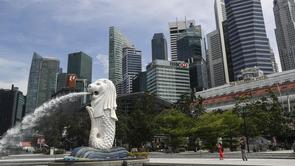 In this file photo taken on Jun 30, 2020, people are dwarfed against the financial skyline as they take photos of the Merlion statue along the Marina Bay area in Singapore. (YONG TECK LIM / FILE / AP)
In this file photo taken on Jun 30, 2020, people are dwarfed against the financial skyline as they take photos of the Merlion statue along the Marina Bay area in Singapore. (YONG TECK LIM / FILE / AP)
SINGAPORE - Singapore's central bank tightened its monetary policy on Thursday, saying the widely forecast move will slow inflation momentum as the city state ramps up its battle against soaring prices made worse by the conflict in Ukraine and global supply snags.
The policy tightening, the third in the past six months, came as separate data showed Singapore's economic momentum waning over the first quarter.
It was the first time in 12 years that the MAS used these two tools simultaneously to tighten policy, underlining policymakers' worries about potential price instability which has seen the US Federal Reserve set an aggressive path to tightening monetary conditions
The local dollar jumped briefly after the Monetary Authority of Singapore re-centered the mid-point of the exchange rate policy band known as the Nominal Effective Exchange Rate, or S$NEER, at its prevailing level. It also increased slightly the rate of appreciation of the policy band.
ALSO READ: Singapore poised to bounce back
It was the first time in 12 years that the MAS used these two tools simultaneously to tighten policy, underlining policymakers' worries about potential price instability which has seen the US Federal Reserve set an aggressive path to tightening monetary conditions.
There was no change to the width of the MAS policy band.
MAS said in a statement that the conflict in Ukraine has driven global inflation forecasts higher and "dented the outlook for growth".
"The fresh shocks to global commodity prices and supply chains are adding to domestic cost pressures," it said, warning that inflation risks remain "elevated over the medium term."
Singapore, a major travel and business hub, made its biggest reopening moves from the COVID-19 pandemic through late March and early April, easing local restrictions and allowing vaccinated travelers from anywhere in the world to enter without having to quarantine.
MORE TIGHTENING?
"The door is definitely not closed yet," said Selena Ling, head of treasury research and strategy at OCBC, referring to another potential tightening in October.
The MAS manages monetary policy through exchange rate settings, rather than interest rates, because trade flows dwarf its economy, letting the Singapore dollar rise or fall against the currencies of its main trading partners within an undisclosed band.
It adjusts its policy via three levers: the slope, mid-point and width of the policy band.
All 16 economists polled by Reuters expected the MAS to tighten but they were divided on which parameters it would change.
The Singapore dollar strengthened about 0.5 percent after the statement and hit a one-week high of S$1.3552 per dollar.
ALSO READ: Singapore restarts border reopening with high inoculation rates
The central bank maintained its forecast for gross domestic product to expand 3 percent to 5 percent this year. The economy grew 7.6 percent in 2021, the fastest in a decade, recovering from a pandemic-induced 4.1 percent contraction the previous year.
Separate advance data on Thursday showed GDP grew 3.4 percent in January-March on a year-on-year basis, versus economists' expectations of 3.8 percent growth, and slower than the 6.1 percent pace in the fourth quarter of 2021.
The MAS tightened monetary policy in January in an out-of-cycle move, which followed a tightening in October, joining many other global central banks, led by the Fed, to get on top of surging inflation.
Earlier on Thursday, South Korea's central bank hiked rates to their highest since August 2019 in an unexpected move.
ALSO READ: S'pore to hike taxes on rich as it winds down virus spending
The Russia-Ukraine conflict has intensified pressure on consumer prices which were already rising rapidly due to coronavirus-driven supply snags. The Singapore government has said it stands ready to respond with fiscal and monetary measures if a deepening Ukraine crisis impacts growth and inflation.
MAS said it will remain vigilant to developments in the external environment and their impact on the Singapore economy.
It expects core inflation to come in at 2.5–3.5 percent this year, versus a prior forecast for 2.0–3.0 percent. Overall inflation is forecast at 4.5–5.5 percent, up from the earlier range of 2.5–3.5 percent.
"The MAS fully recognize that if inflation continues to surprise to the upside, there's a possibility they have to do more at future policy meetings," said Khoon Goh, head of Asia research, ANZ.


